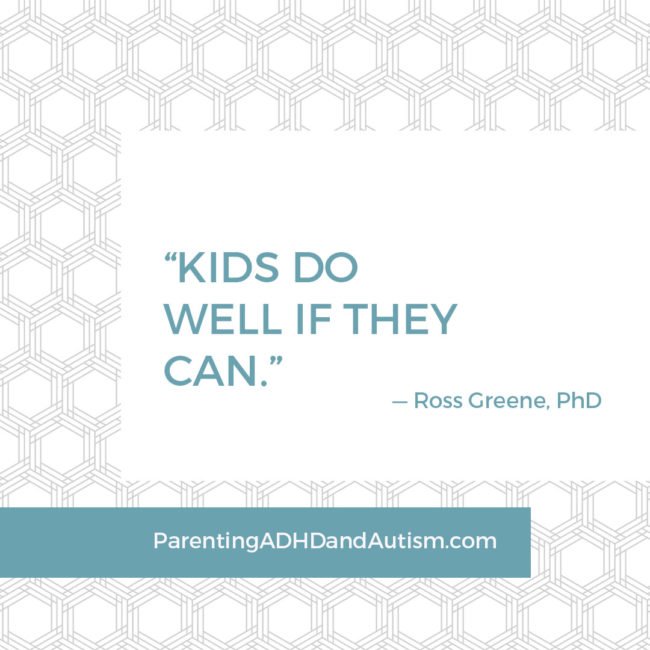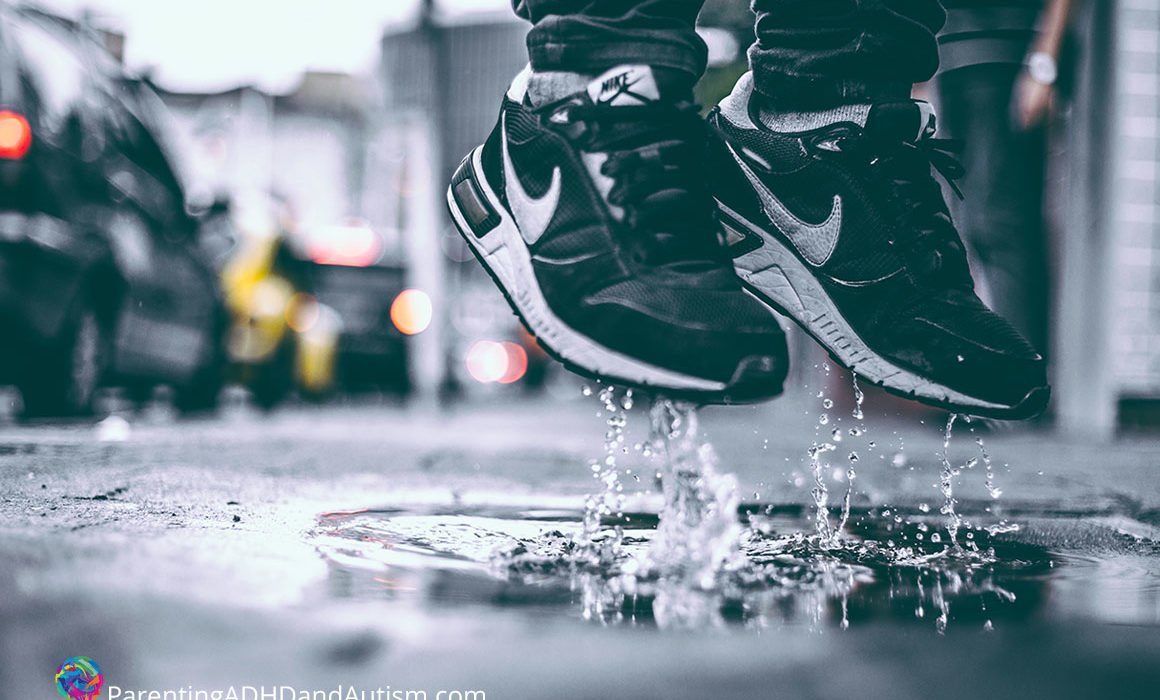Stop Thinking of Behavior as “Good” or “Bad:” It’s So Much More Than That
Stop Thinking of Behavior as “Good” or “Bad:” It’s So Much More Than That

Today, I’m going to ask you to turn everything you know on its head. (I know, I do that a lot.) You’re going to throw out yet another piece of that traditional parenting paradigm that simply doesn’t work for kids with ADHD and/or “high-functioning” autism, or really any kids for that matter.
It’s time to unlearn everything you think you know about kids’ behavior. Yep, pretty much everything. You see, behavior isn’t “good” or “bad,” because that implies a deliberate decision to do right or wrong. Can it be a conscious decision sometimes? Well, sure, but we’re talking about the majority of the time here, when it’s not a decision, but a symptom. Most of the time, behavior isn’t inherently good or bad. Rather, it’s a symptom of capability to meet expectations versus incapability to meet expectations. Or, having their needs and expectations met versus not having their needs and expectations met.
Here’s a simple example and a personal pet peeve that really gets under my skin. People talk about babies being “good” or “bad.” We’re talking about infants — newborn babies that don’t yet have the capability to choose how they communicate their needs, much less right from wrong. Yet, people will ask of a new mom, “Is he a good baby?” Ugh! That lights me on fire. What they mean to ask is if he’s an easy baby — sleeping well, not crying frequently — not a “good” baby. We’re aware of these semantics in our culture, but using this language perpetuates this idea of “good” kids versus “bad” kids from infancy. That’s not ok.
Replacing “Good” and “Bad”
When a child is what American society often labels as “good,” he’s really just meeting expectations appropriately. When a child is what many would call “bad,” she’s not meeting expectations, or not meeting them appropriately. It’s that simple. It isn’t a matter of intention, morals, or ethics of the child. Rather, it’s a matter of having the opportunity to succeed. The behavior is a symptom — not a symptom of character and personality, but a symptom of capability to communicate well and to meet expectations.
Now, don’t mistake what I’m saying. I’m not saying that you’re failing to provide opportunities for your child to succeed if your child often has behaviors that might be labeled as “bad.” Quite the contrary. I’m saying either
- your expectations are out of scale with capability because your child has a developmental disorder and you aren’t adjusting for that, or,
- there are problems creating barriers to success that still need to be solved.
In a nutshell, you’re not yet addressing the root reasons for the behaviors, or not yet addressing the underlying reasons effectively.
Really, what most people (who don’t know better) see as “good” versus “bad” is frequently a matter of neurotypical versus developmentally delayed for our kids. When you put on those special perspective glasses to see and acknowledge the delays and differences in your child’s brain, “good” and “bad” fall away, as they should.
Kids Want to Do Well
For our kids, “good” versus “bad” is wanting to do well and achieving it, versus wanting to do well and not being capable of achieving it.
It’s adopting Ross Greene, PhD’s mantra, that “Kids do well if they can.” It’s not “when they can,” or “if they want to,” it’s IF THEY CAN. Your child wants to do well — she doesn’t want to be “bad” or even be perceived as “bad.” Because of that, she’s going to do everything within her power to do well. Within her power — remember, that’s the key piece. She’s going to fight like hell to do the things people expect of her. But, despite all that, she may not do well, because she simply cannot in that instance.
 While the following is an analogy no parent wants to contemplate, I’m outlining it for you anyway, because it gives you a palpable sense of just how dire having unrecognized and/or unmet needs feels to our kids sometimes, and just how badly they really do want to meet expectations, and be the “good” kid.
While the following is an analogy no parent wants to contemplate, I’m outlining it for you anyway, because it gives you a palpable sense of just how dire having unrecognized and/or unmet needs feels to our kids sometimes, and just how badly they really do want to meet expectations, and be the “good” kid.
Imagine that your child was swimming in the ocean and drifted into a rougher current than he has the strength to break free of. He’s out there screaming for help, paddling his feet and arms as hard as he can, but he’s making little progress, and tiring quickly. Other kids his age would be able to get themselves to safety, but your boy just can’t. He physically cannot. He desperately wants to — we’re talking life or death here — but he can’t.
As his parent, you could sit idly by and tell him he should be able to save himself, like his friend out there swimming with him did. You could hold fast to your belief that he’s capable and that he just doesn’t want to try hard enough to save himself.
Or, you could recognize that his screaming and flailing about in the water is behavior that signals that he’s working hard but not capable to meet the expectation set for him and he needs your help to solve the problem. You decide that he’s not being “bad,” but that he really isn’t capable of doing it on his own and you throw him a life preserver. You lower the expectation to his actual capability, help him solve the problem, and he is then able to get to shore safely.
Change Your Thinking
That analogy is quite descriptive of what life often feels like for kids with ADHD and/or “high-functioning” autism. They’re working as hard as they can, but sometimes the only way to communicate that, or the only way to be heard when communicating that, is through behavior. It’s not “good” or “bad,” it’s simply a symptom of the underlying problem.
I challenge you to change your thinking. Remove good and bad from your vocabulary when it comes to describing kids or describing behavior from kids. Just stomp it down and toss it out. It’s harmful, especially for kids with ADHD and autism. Being called “bad” only damages your child’s already fragile self-esteem even further.
In addition, this new perspective of viewing behavior as a symptom now — as a measure of capability to meet expectations — is freeing, isn’t it? Now we see that our kids aren’t doing the wrong thing (they’re not inherently “bad”), but not yet able to do what is expected. They’re not “good” or “bad,” and their behavior isn’t “good” or “bad.” It’s merely a symptom indicative of their current experience and a need for your compassion and assistance.



